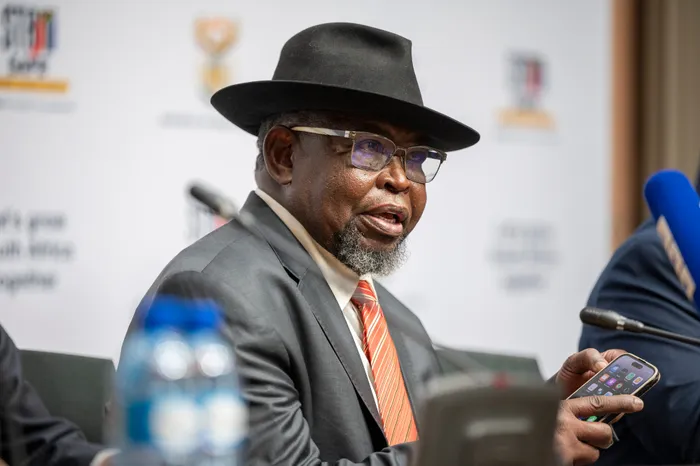
Finance Minister Enoch Godongwana announced this past Thursday that the National Treasury will no longer be implementing the controversial 0.5 percentage points increase in the value-added tax (VAT).
Image: Armand Hough / Independent Newspapers
South Africans celebrated Finance Minister Enoch Godongwana announcement made this past Thursday that the National Treasury will no longer be implementing the controversial 0.5 percentage points increase in the value-added tax (VAT) from 1 May, which was proposed in the National Budget to plug the R58 billion fiscal deficit.
His decision marks a significant victory for financially constrained consumers and highlights the government's responsiveness to widespread pushback and legal challenges, even from its own coalition partners within the Government of National Unity (GNU).
Godongwana had last month proposed to increase the VAT from 15% to 15.5% from 1 May, and to 16% a year later, after his Budget Speech was unexpectedly postponed at the eleventh hour in February when he proposed to increase VAT by a once-off 2 percentage points.
Instead, Treasury on Thursday said Godongwana will shortly introduce the Rates and Monetary Amounts and the Amendment of Revenue Laws Bill, which proposes to maintain the VAT rate at 15%.
Debt Rescue CEO Neil Roets, welcomed the withdrawal, calling it a vital and timely relief for South African consumers facing immense financial strain.
"The VAT hike, originally scheduled to take effect on 1 May 2025, sparked significant legal and public opposition, ultimately leading to its reversal. I hope that this decision signals a growing awareness within government of the economic pressures facing consumers. With a steep electricity tariff hike already implemented on 1 April, a VAT increase would have further strained household budgets and pushed many families to breaking point,” he said.
Frank Blackmore, lead Economist at KPMG, told Business Report that the VAT U-turn was down to mainly two reasons.
"The first reason was obviously the social backlash that was received on this proposal and the second was that the revenue authorities managed to collect an extra sort of R10 billion from the previous year. Therefore, there was no need to institute a vat hike to get this additional revenues," Blackmore said.
"Even in the planning, the additional revenues that would have come from this half a percentage point of our time could have been around R13.5 billion but if you take the zero rated goods into account that reduces to around this R10 billion making it a moot point for this budget. I think it's important to note that South Africa is also facing a lot more stress given the pressures put on it and by the global trade war that is currently ongoing," Blackmore said.
“This proves that the funds could have been sourced without adding pressure to consumers,” Roets said.
Roets added that the revised budget has strengthened SARS's capacity to close the tax gap and improve compliance.
“With enhanced support, SARS is now better positioned to pursue overdue taxes from corporates, high-net-worth individuals, and those whose declared income does not align with their financial activity,” Roets added.
The Debt Rescue CEO further stressed that it must be the start of a broader shift in government’s fiscal approach.
He urged policymakers to adopt longer-term measures to support consumer resilience, including:
"We urgently appeal to South Africa’s major food retailers to consider a different approach to the pricing structure of essential items, as many families are finding it increasingly difficult to afford basic necessities. The ongoing rise in the cost of living, particularly food, is placing severe strain on households that already allocate most of their income to groceries. A revised, more accessible pricing model on staple goods could go a long way in helping consumers manage. We ask retailers to re-evaluate their current strategies in light of this crisis, and to explore ways to ease the pressure on everyday shoppers. South Africans cannot continue to absorb the consequences of fiscal shortfalls. This decision is a meaningful step in the right direction, but sustainable relief will require a consistent focus on efficient public finance management and consumer protection,” Roets said.
Meanwhile, Blackmore added that the next item from the Minister's budget that will be adjusted is the growth rate for this year for South Africa.
Blackmore said, "The growth rate for this year for South Africa was at 1.9% but given the events in the US of the imposition of tariffs as well as our local missteps in terms of policy and management, I think we'll be lucky to get close to that 1% growth this year. Therefore, expectations of revenue would be paid back along with that growth rate for this particular year. I think it's also important that with the cancellation of this proposed vat hike that the extra money is found through expenditure, savings, and on unnecessary areas of expenditure and does not come importantly from service delivery which is relied on by most South Africans in terms of health, education, social grants and other public sector delivery that is expected."
"I think it is vital for that to happen that costs or cut and expenditures is left alone in order to create some kind of momentum in terms of economic growth in future," Blackmore said.
BUSINESS REPORT